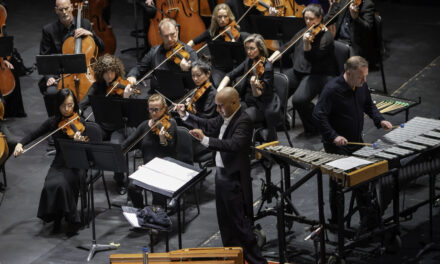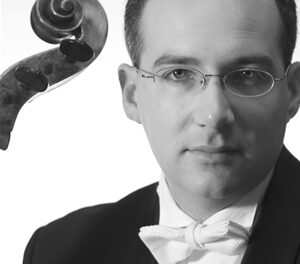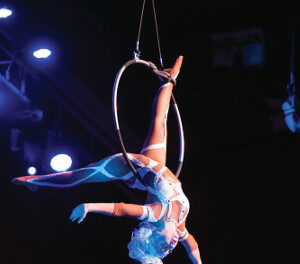On May 25 I watched via livestream the world debut and showcase of the five finalists of the 2023 American Pianists Awards – Caelan Cardello, Esteban Castro, Paul Cornish, Thomas Linger, and Isaiah J. Thompson. Each pianist is competing for the prestigious Cole Porter Fellowship, given every four years to an American jazz pianist at the conclusion of the organization’s unique 13-month competition. The 2023 American Pianists Awards promise to be one of the most competitive yet, providing winners with cash, two years of career advancement and support (valued at over $200,000). Recent winners read as a who’s who of dominant new voices on the global jazz scene: Emmet Cohen (2019) (see my review of his wonderful concert at Jazz Arts Charlotte on 5/20/22), Sullivan Fortner (2015), and Aaron Diehl (2011). This is a unique opportunity to glimpse the future of jazz piano in the most intimate of settings.
In the live audience were many important people who can make a big difference in their careers: representatives from Mack Avenue records, DL Media (publicists for the APA Cole Porter Fellowship), Steinway, Yamaha, top jazz artists Bill Charlap, Fred Hersch, Christian McBride, and Melissa Walker, past winners Emmet Cohen, Sullivan Fortner, and Aaron Diehl, and twenty-five board members from the Indianapolis-based APA.
Dizzy’s is a wonderful setting for jazz, the livestream sound and video were perfect, and the full windows behind the stage gave the audience a great view of NYC. But the music was the main focus for sure, and the pianists put on an excellent show. A quick overview of what was heard: the excellent technique of each pianist, their ability to hold tempos and create interesting arrangements of tunes without the assistance of bass and drums, a wide selection of tunes including a few well-known jazz standards, Cole Porter tunes, some lesser well-known pieces by famous modern jazz pianists, and their own original tunes. Their original tunes seemed to be selected in response to the recent tragic events in America, so they evoked a solemn atmosphere. But there were many energetic moments especially when three of the pianists, Castro, Cardello and Thompson, launched into stride piano. For the last 40 years or so pianists haven’t played much stride except for a few, such as Dick Hyman. The audience seemed to appreciate those moments the most. Nowadays it seems many young pianists are realizing the entertaining quality of this difficult style. It so happens that the three who used that style were all students in the Jazz House Kids program. Credit needs to be given to Jazz House Kids for instilling traditional early jazz into these young players.
Grammy-winning vocalist Dee Dee Bridgewater was the host, and she introduced the players, who performed two tunes each in the first set and then two more in the second set.
The first set began with Castro performing “Get Out of Town” by Cole Porter. Castro is just 18 but he has already had many years of classical and jazz training. His classical style was in very effective use in this piece as he played a lovely impressionistic introduction and then impressively created syncopated countermelodies with his left hand in the following chorus of the tune. Throughout the five or six choruses of his arrangement, he varied the texture and dynamics interestingly. His original tune “My Native Shore” certainly invoked the sound of water, as it gently flows or when it is whipped up by the wind. With strong counterpoint and good development of his theme along with the influence of Chick Corea and Keith Jarret, I found this to be an enjoyable performance sounding a little like a jazz-inspired classical concerto.
Next up was Cornish, who played “Along Came Betty” by Benny Golson and “Dolphin Dance” by Herbie Hancock. He was the most abstract player of the group – he used a lot of space and off-beat phrasing. He also tended to favor bass melodies and right-hand melodies in counterpoint. The sparseness of his style was relaxing, but at times when his energy rose, he dashed up and down the keyboard, almost invoking the sounds of the avant-garde pianist Cecil Taylor.
Then Cardello played “Anything Goes” by Cole Porter and “Darn That Dream” by Jimmy Van Heusen. He played with a much more straight-ahead style and was very good at it. His left hand was used more for playing the chords and less for bass lines and countermelodies. This made it easier to follow his right-hand improvisations which often had fast scalar flourishes in the style of Oscar Peterson. There was much to like about his playing; he improvised melodies in octaves and he played some stride. Quotes from the tune “In Walked Bud” were inserted at good moments and he effectively modulated keys in later choruses which kept the energy building.
Following him was North Carolina native Linger, who when he lived here was my favorite pianist and we recorded together. He has been in NYC for four or five years and has risen to the top echelon. He played “Search for Peace” by McCoy Tyner and his original “A Lovely Encounter.” He said Tyner’s composition was a tune for the times and he played it very sensitively. Linger’s full chords and expansive scalar runs matched the sound of Tyner. His “A Lovely Encounter” is a straight-ahead ABAC tune with a catchy melody, and he often accompanied it with a strong walking bass line.
Last up in the first set was Isaiah J. Thompson, who played two originals: “The Cake Walk Dilemma” and “A Prayer.” He engaged all of us immediately on the first tune with a very soulful and swinging rhythm. I really felt the drive and deep feeling of his music, because of his use of dissonance (combination of notes in small intervals), blues notes, and a strong beat. His “A Prayer” also was very appropriate for the times we live in because it’s very spiritual, and it made a very good hymn for all those who lost their lives in recent weeks.
For the second set the pianists went in reverse order, so Thompson started “Everything Happens to Me” by Tom Adair and Matt Dennis. After a nice introduction he got into a bouncy walking bass and he added flourishes reminiscent of the greatest solo pianist of all time, Art Tatum. Next was “Night Mist Blues” by Ahmad Jamal and on this we again heard Thompson’s deep relationship with the blues and his ability to make the piano and his music speak to us.
Linger, in another nod to Cole Porter, played “I Concentrate on You.” His lush chords in the rubato intro and first chorus and ending were beautiful, and his fast dashes up and down the scales and arpeggios of the chords were also reminiscent of Tatum. In his second and third choruses he played a very steady walking bass which supported his right-hand improvisation which was packed full of ideas. Linger said his next tune “Night Ride” was a pandemic baby (born during the pandemic when many musicians were home alone and practicing). It sounded a bit like a way to challenge himself improvising over a challenging chord exercise similar to Giant Steps by John Coltrane.
Cardello started with a reflective ballad, “I’ll Let You Know” by Cedar Walton, and he played it very well with a steady, slow tempo, often inserting fast scalar runs on the chords with some more of the blues inflections that you hear in Oscar Peterson’s runs up and down the keyboard. But then he played the stride tune, “Weather Bird” by Louis Armstrong and Earl Hines, and this was the most energetic and crowd-pleasing piece of the night.
Cornish then continued his individual approach on “Unconditional Love” by Geri Allen and his original “5am.” Cornish’s abstract and subtle style was a pleasing contrast to the other players. But when he attained climaxes it was with a with heated counterpoint that showed he is just as technically advanced as the other players.
The last performer of the evening was Castro, who played “Darn That Dream” by Jimmy Van Heusen. His command of the keyboard was obvious with his beautiful intro, walking bass lines, reharmonizations, and an immense rhapsodic ending.
The last tune was announced as something we all knew, but I don’t know if that was true. It was a stride piece (which as I said hasn’t been popular for the last 40-50 years). But I guessed right – it was “Carolina Shout” by James P. Johnson. Castro played the stride style very well, but he ended the tune with a storm of notes that I didn’t find fit the style. I think he over did it there, and I hope he finds that oftentimes less is more. But he is only 18 and already with amazing command of the piano – I’m sure he is going to be a top pro.
It will be interesting to watch how all of these young pianists grow over the next 13 months of the competition. I’ll be looking forward to hearing them play some faster tempos in the style of Tatum and Peterson, more chord reharmonizations in the style of Bill Evans, and a little less busyness on the keyboard. You can watch the performances for the first set and second set on Youtube.













